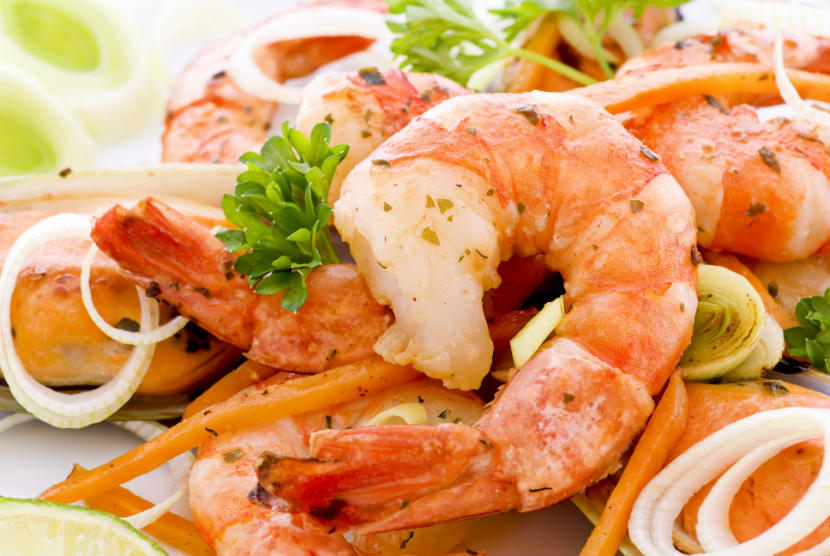
Did you know that seafood is one of the most common food allergens in Canada? For people who are allergic, avoiding seafood while still eating a balanced diet is important. Read on to get the facts on seafood allergies.
What foods are considered seafood?
Seafood refers to all fresh and saltwater fish, crustaceans and shellfish. Examples of common seafood include:
- Fish: Anchovy, bass, bluefish, carp, catfish, char, cod, flounder, haddock, halibut, herring, orange roughy, mahi-mahi, sardines, salmon, trout and tuna
- Crustaceans: Crab, crayfish, lobster, prawns and shrimp
- Shellfish: Abalone, clams, conch, mussels, octopus, oysters, scallops, sea snails (escargot) and squid (calamari)
- Other: Caviar and roe, kamaboko and surimi (imitation crab and lobster meat) and tarama (salted carp roe)
What is a seafood allergy?
A seafood allergy is when the body’s immune system mistakes seafood as harmful. For some people who are allergic, seafood can cause life-threatening reactions. If you are allergic to one type of seafood, you may not be allergic to another. It’s best to speak with your allergist about the types of seafood you are allowed and not allowed to eat.
What are the symptoms of a food allergy?
Like other food allergies, having an allergic reaction to seafood can include any of the following symptoms:
- Flushed face, hives or a rash, red and itchy skin
- Swelling of the eyes, face, lips, throat and tongue
- Trouble breathing, speaking or swallowing
- Itchy skin
- Anxiety, distress, fainting, paleness, sense of doom and weakness
- Cramps, diarrhea, vomiting
- A drop in blood pressure, rapid heartbeat and loss of consciousness (in extreme cases)
When is a seafood allergy usually diagnosed?
In Canada, seafood allergies are most common in adults and are less common in children. An allergist can confirm if you have a seafood allergy if you suspect it.
Can a seafood allergy be outgrown?
It isn’t likely. Allergies to fish, crustaceans and shellfish are usually a lifelong condition.
What foods may contain seafood?
Foods that most commonly contain seafood include:
- Combination foods like fried rice, spring rolls, and paella
- Dishes that are often prepared with fish-based sauces, like oyster sauce
- Sushi
- Salad dressings
- Sauces, like steak and Worcestershire
- Seafood soups and broths
- Spreads like taramasalata
Food products that sometimes contain seafood include:
- Deli meats
- Dips, spreads and salad dressings
- Foods that contain gelatin like marshmallows or hot dogs
- Fried foods (from contaminated frying oil)
Are fish oil supplements safe for a person with a seafood allergy?
People who have a seafood allergy may have a reaction to fish oil supplements such as omega-3 supplements. Before taking any fish oil supplements, consult with your healthcare provider or allergist to find out if they are safe for you.
Tips for following a seafood-free diet
If you are allergic to seafood, it is best to avoid all food and products that contain fish, crustacean or shellfish that you are allergic to. Keep these helpful tips in mind:
- Canadian guidelines require that seafood-containing products are clearly labeled. Always read the ingredient list carefully. The ingredient list will say “Contains: fish, shellfish or crustaceans”(or the specific name of the seafood, like shrimp, lobster, crab) if it contains this ingredient. If a product does not contain seafood, but there is a risk of the food having come into contact with seafood (cross-contamination), you will see “may contain” followed by the name of the seafood, like shrimp, listed at the end of the ingredient list. It is best to also avoid these foods.
- Read the label every time. Food manufacturers often change ingredients used in their products without notice.
- Avoid foods that say “may contain” followed by the name of the seafood, like lobster, on their labels.
- If you are unsure whether a product contains seafood or fish you are allergic to, contact the manufacturer. Many food packages have contact information on them.
- Don’t take chances. Avoid foods that do not have a clear ingredient list. This includes avoiding imported products, as they do not always have an accurate food label.
- Be informed. Sign up for the Canadian Food Inspection Agency’s (CFIA) free email “Food Recalls and Allergy Alerts” notification service.
- Be careful if you have a fish or seafood allergy. It is possible to experience an allergic reaction from fish or seafood being cooked or steamed even if you don’t eat it.
- When eating out, ask if seafood or seafood-based ingredients are used to determine if the menu item should be avoided.
- Instead of fish-based sauces, add low-sodium soy sauce or Tabasco sauce for extra flavour in rice or noodle dishes.
- Swap seafood for tofu in your stir fry for a good source of protein, like in this sweet chili tofu stir fry
- Beans and lentils make hearty additions to salads instead of seafood, like in this black bean couscous salad.
How can a dietitian help?
A
dietitian can work with you to tailor your diet based on your allergies, preferences and culture. For example, a dietitian can help you find ways to get the important omega-3 fats you need while avoiding the foods you are allergic to.
Connect with a dietitian today!
Bottom line
You can still eat a balanced diet if you have a seafood or fish allergy. Get creative with other protein options like tofu, beans, lentils, chicken, eggs, lean meats and nuts to replace the seafood you are allergic to. If you aren’t sure whether a product contains seafood, don’t take any chances. Carefully reading the ingredient list of food products every time is important to avoid an allergic reaction.
You may also be interested in:
Food allergies and intolerances
Food allergies and babies
Understanding food labels in Canada
This article was written and reviewed by dietitians from Dietitians of Canada.
Last Update – October 28, 2021